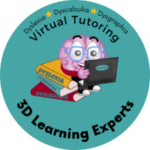Finding out your child has Dyslexia can bring a mix of emotions—relief at finally having answers, and worry about what comes next. The good news? You’re not alone, and there’s a clear path forward. Dyslexia doesn’t define your child’s potential. With the right support, they can thrive academically, socially, and emotionally.
Take a Breath—Then Take Action
For many parents, a Dyslexia diagnosis validates what they’ve suspected for a long time. Maybe reading was always a struggle, or your child had trouble with spelling or writing. You might have been told they were “lazy,” “not trying hard enough,” or “just a late bloomer.”
Now you know the truth: your child learns differently. And that’s okay.
This is your moment to shift from confusion to clarity. Understanding Dyslexia—and what to do next—will empower you and your child to move forward with confidence.
Learn What Dyslexia Really Is
Dyslexia is a brain-based learning difference that affects how a person processes written language. It often impacts skills like:
- Decoding (sounding out words)
- Spelling
- Reading fluency
- Writing and organization
Dyslexia is not caused by low intelligence, vision problems, or lack of effort. Many kids with Dyslexia are highly intelligent, creative, and capable—they just need different ways to learn.
Step 1: Understand Your Child’s Specific Needs
Not all Dyslexia looks the same. Some kids struggle more with decoding, others with fluency or writing. That’s why it’s important to get a comprehensive evaluation that highlights your child’s strengths and challenges.
Ask questions like:
- What kind of support will they need at school?
- Would they benefit from specialized tutoring?
- Do they need accommodations on tests or assignments?
Every Dyslexic learner has a unique profile. The more you understand your child’s, the better you can advocate for them.
Step 2: Partner With the School
Once you have a diagnosis, you can work with your child’s school to create a support plan. This may include:
- An IEP (Individualized Education Program) or 504 Plan
- Classroom accommodations, like extra time or audiobooks
- Specialized instruction, such as Orton-Gillingham-based reading programs
Be proactive and stay involved. You know your child best, and your voice matters in shaping their educational experience.
Step 3: Consider Specialized Tutoring
School support is helpful, but many children with Dyslexia benefit from additional, personalized instruction outside of the classroom.
A specialized Dyslexia tutor can:
- Use proven, multisensory methods that build reading skills step-by-step
- Reinforce phonemic awareness, decoding, and spelling strategies
- Support your child emotionally as they gain confidence
Progress is possible. Many children who once struggled with reading go on to become strong, enthusiastic learners—especially when they receive consistent, targeted help.
Step 4: Focus on Emotional Wellness
Kids with Dyslexia are often painfully aware that they’re struggling. They might compare themselves to classmates or feel like they’re letting you down.
Here’s how you can help:
- Remind them often that Dyslexia doesn’t mean they’re not smart.
- Celebrate their strengths—in art, music, problem-solving, or storytelling.
- Encourage effort, not perfection.
- Share stories of successful people with Dyslexia, like Steven Spielberg, Octavia Spencer, and Richard Branson.
Confidence is just as important as academics. A child who feels seen and supported will be more willing to keep trying, even when things feel hard.
Step 5: Build a Long-Term Support Network
Dyslexia is a lifelong difference, but it doesn’t have to be a lifelong struggle. Surround your child with people and tools that help them succeed. This might include:
- Reading specialists or tutors
- Supportive teachers
- Parent groups or local organizations
- Assistive technology like text-to-speech tools or apps
You don’t have to figure it out all at once. Start with one step, then the next. Progress builds over time.
Let Us Help You Take That Next Step
At 3D Learning Experts, we understand the unique challenges families face after a Dyslexia diagnosis. Our personalized tutoring programs are built around each child’s learning style and pace. We don’t just teach reading—we build confidence, resilience, and joy in learning.
Schedule a free consultation today and let’s talk about how we can support your child and help them move forward with confidence.

